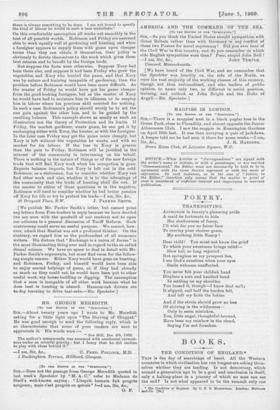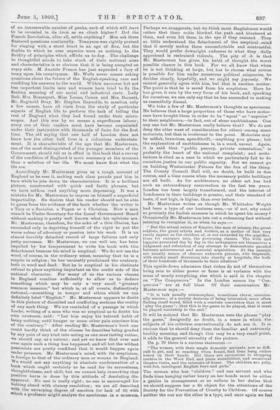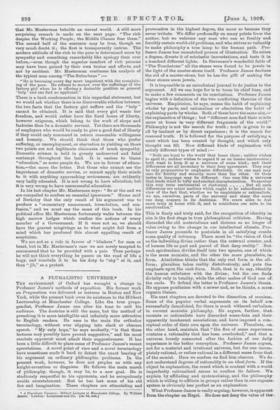BOOKS.
THE CONDITION OF ENGLAND.*
Tilts is the day of searohings of heart. All the Western countries in which civilisation lute run longest are asking them- selves whither they are tending. Is not democracy, which seemed a generation ago to be a goal and conclusion in itself, only a halting-place in a journey of which no man can see the endP Is not what appeared to be the summit only one • The Condition of England. By C. E. G. Mastennau. London; Methuen and Co. Pe.]
of an innumerable number of peaks, each of which will have to be revealed in its turn as we climb higher P Did the French Revolution, after all, settle anything ? Men ask these flustered questions continually, Tennyson was rightly praised for singing, with a stout heart in an age of flux, but the doubts to which be rose superior were as nothing to the fluidity of principles which afflicts us to-day. The challenge to thoughtful minds to take stock of their national aims and characteristics is so obvious that it is being accepted on every side. M. Anatole France has just expended a fury of irony upon his countrymen. Mr. Wells never ceases asking questions bout the future of the English-speaking race and confiding his answers to the world. Within narrower but not less important limits men and women have tried to fix the fleeting meaning of our social and industrial state. Lady Bell, Mrs. Bosanquet, Miss Loam, Canon and Mrs. Barnett, Mr. Reginald Bray, Mr. Stephen Reynolds, to mention only a few names, have all risen from the study of particular aspects of English life to perform the task of telling the rest of England what they had found under their micro- scopes. And this was by no means a superfluous labour; every one of their readers must have become acquainted under their inetruction with thousands of fads for the first time. The old saying that one half of London does not know how the other half lives is a ridiculous understate- ment. It is characteristic of the age that Mr. Masterman, one of the most distinguished of the younger members of the Government, should tell us in effect in this book that a survey of the condition of England is more necessary at the moment than a solution of her ills. We must know first what the ills are.
, Accordingly Mr. Masterman gives us a rough account of England as he sees it, making each class parade past him in turn while be jots down its characteristics. It is a brilliant picture, constrncted with quick and facile phrases, but we have seldom read anything more depressing. It was a mistake for Mr. Masterman to impose on himself a superficial impartiality. He desires that his reader should not be able to guess from the evidence of the book whether the writer is a Tiny or a Socialist, a Pagan or a Christian. Now a man cannot be Under-Secretary for the Local Government Board without making it pretty well known what his opinions are. Mr. Masterman, therefore, for the sake of a thin illusion, has succeeded only in depriving himself of the rig,,ht to put the warm colour of advocacy or passion into his work. It is an almost horribly detached record of large failures and only petty successes. Mr. Masterman, we can well see, has been impelled by his temperament to write his book with this detachment because his Mind is sceptical. We do not use the word, of course, in the ordinary sense, meaning that he is a sceptic in religion ; he has earnestlyproclaimed the contrary, both in word and deed. But be is sceptical in his obstinate refusal to place anything important on the credit side of the national character. For many of Us the various classes in England combine sufficiently to allow us to deduce something which may be only a very small "greatest common measure," but which is, at all events, distinctively national,—something in temper and ethics Which we can definitely label "English." Mr. Musterman appears to doubt in this picture of disunited and conflicting sections the reality of any such thing. We are reminded of a passage in which Locke, writing of a man who was so sceptical as to doubt his own existence, said: "Let him enjoy his beloved habit of being nothing, until hunger or some other pain convince him of the contrary." After reeding Mr. Masterman's book one could hardly think of the classes he describes being goaded 11 any pain of any kind into acting as one man (tiding rather, we should say, as a nation); and yet we know that over and over again such a thing has happened, and all but the wildest pessimists are pretty confident that it would happen again under pressure. Mr. Masterman's mind, with its scepticism, is foreign to that of the ordinary man or woman in England. Wo would not say anything in absolute condemnation.of a book which ought certainly to be read for its earnestness, thoughtfulness, and skill, but we cannot help remarking that Positive harm is done by this attitude of desolating die- Approval. No one is really right; no one is encouraged for butting ahead with clumsy resolution; we are all described with the unvarying degree of emotion (or lack of it) with which a professor might analyse the specimens in a museum. Perhaps we,exaggerate, but we think most Englishmen wthild rather that .their critic •blocked the path and blustered at them, and even bit them in the eye if they resisted. They
so little understand the detachment of the seeptiotil ..mind that it merely makes them uncomfortable and mistrustful. They would prefer downright rudeness to what they dully
apprehend is restrained ridicule. • The pity of it is that Mr. Masterman has given his habit . of thought the worst possible chance in this book. For we all. know that when he is not thinking at large, but has to choose what coin-se is possible for liim under numerous political exigencies, lie decides clearly, hopefully, and we might say joyously. -We cannot generally agree with him, but that is another matter. The point is that be is saved from his scepticism. Here he has given it rein by the very form of his book, and, speaking
for Ourselves, we can only say that he has succeeded in making us resentfully dismal.
We take a few of Mr. Masterman's thoughts as specimens. He believes that a large proportion of those who have motor- cars have bought them in order to be " equal " or " superior " to their neighbours,--in fact, out of sheer snobbishness. Can any one but Mr. Masterman really believe that? We do not deny the utter want of consideration for others among some motorists, but that is irrelevant to the point. Motorists may be selfish, luxurious, spendthrift,—anything you. please ; but the explanation of snobbishness is, in a word, unreal. Again, it is said that "public penury, private ostentation," is probably the heart of the national complaint ; and arelii- tecture is cited as a Cage in which we particularly fail to do ourselves justice in our public capacity. But we cannot go on building Westminster Palaces for the fun of the thing. The County Council Hall will, no doubt, be built in due course, and a time comes when the necessary public buildings are all built. As for architecture, no other art has had such an extraordinary resurrection in the last ten years. London has been largely transformed, and the interest of Londoners in their buildings is greater, and their standard of taste, if not high, is higher, than ever before. • .
Mr. Mastertnan writes as though Mr. Whittaker Wright had been a type of our business inen,—or if not,' why retail so precisely the foolish excesses in which he spent his Money P Occasionally Mr. Masterman lets outii redeeming fact without peeming to recognise it, as when he says:—
" Buttlie actual rulers of Empire, the men of 'science, the great soldiers, the great artists and writers, as a matter of fact very. rarely appear as the children of, or are rewarded by the qualifies- lions for entrance into, the governing. classes. The wills and legacies presented day by day in the newspapers are themselves a, judgment and refutation of any attempt to demonstrate parallel between achievement and material acquisition. At the summit arc usually names of obscure unknown persons, who bequeath, with sundry small diversions into charity or hospitals, the hulk . of their hundreds of thousands to their relatives."
This upside-down admission that riches do not of themselves bring men to either power or fame is at variance with the souse of nearly everything else which is said in the chapter on "The Conquerors." In the Loudon season the "Con, querors " mire at full blast. Of their conversation Mr. Masten:nail says :— "It is talk usually commonplace, sometimes clever, occasion- ally sincere; of a society desirous of being interested, more often finding itself bored, filled with a resolute conviction that it must 'play the game' ; that this is the game to be played, that it must be played resolutely to the end."
It will be noticed that Mr. Masterman uses the phrase "play the game," designedly no doubt, in a sense in which the ; subjects of his criticism conventionally do not use it. It is curious that he should deny them the familiar and extremely healthy meaning, and though this may be a very small point, it adds to the general urn-entity of the picture.
On p. 70 there is a curious statement:— " The women, with their single domestic servants, now so diffi- cult to get, and so exacting when found, find time hang rather heavy on their hands. But there are excursions to shopping centres in the West End, and pious sociabilities, and oocasional theatre visits, and the interests of borne. The children are jolly, well-fed, intelligent English boys and girls."
The woman who has "children" and one servant and who finds time hanging rather heavy on her hands must be either a genius in management or so callous, in her duties that we should suppose her a fit object for the attentions of the Society for the Prevention of Cruelty to Children. Of course neither the one nor the other is a type, and once again we feel "that Mr. Masterman beholds an unreal world. A still more surprising remark is made on the next page : "The rich despise the Working People; the Middle Classes fear them." The second half of the sentence may be true, though we very much doubt it ; the first is transparently untrue. The modern attitude of the rich to the poor is determined more by sympathy and something remarkably like apology than ever
before,—even though the superior comfort of rich persons may have been gained by their own brains and efforts, and not by accident. Mr. Masterman continues his analysis of the typical man among "The Suburbans" "Ho is becoming every day more impatient with the complain- ing of the poor. He refuses to mourn over the sufferings of the factory girl when he is offering a desirable position as general 'help' and can find no applicant" There is a tacit condemnation in this impartial statement, but we would ask whether there is no discoverable relation between the two fads that the factory girl suffers and the " help " cannot be obtained. It is said that every girl wants her freedom, and would rather have the fixed hours of liberty, however exiguous, which belong to the work of shops and factories than be a domestic servant. Yet there are thousands of employers who would be ready to give a good deal of liberty if they could only command in return reasonable willingness and honesty. We should think that those who prefer suffering, or unemployment, or starvation to yielding on those two points are not legitimate claimants of much sympathy. Domestic science is held in grossly undeserved and fatal contempt throughout the land. It is useless to blame "education," as some people do. We are in favour of educa- tion,'—the more the better. But those who cannot see the importance of domestic service, or cannot apply their minds to it with anything approaching seriousness, are evidently very badly educated. It is not wrong to have education, but it is very wrong to have unsuccessful education.
In his last chapter Mr. Masterman says "So at the end we are compelled to confess an essential ignorance." Hume said of Berkeley that the only result of his argument was to produce a "momentary amazement, irresolution, and con- fusion," and we must say the same of this book. In his political office Mr. Masterman fortunately walks between the high narrow hedges which confine the actions of every member of a Government. If it were not so, we should have the gravest misgivings as to what might fall from a mind which has produced this almost appalling result of scepticism.
We are not as a rule in favour of "blinkers" for man or beast, but in Mr. Masterman's case we are sorely tempted to recommend that he be provided with a pair. Then perhaps he will not think everything he passes on the road of life a bogy, and conclude it to be his duty to "shy" at it, and thou " jib," as a protest.












































 Previous page
Previous page